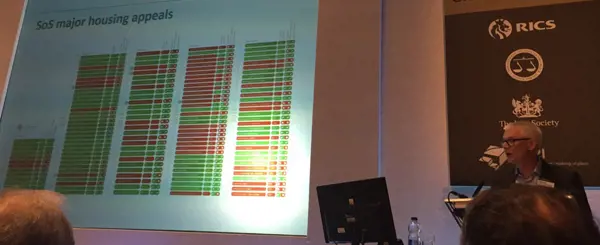
Would you tell me, please, which way I ought to go from here? Planning reform: a view from the coalface
James Fennell
22 Sept 2016
The following is an extract from a paper I presented at the 44th Joint Planning Law Conference held in Oxford over last weekend.
The Housing and Planning Act 2016 is very much at the forefront of Government reform of the planning system. After a rather difficult passage through the two Houses of Parliament, a huge amount of the detail has been left to be legislated for later. This process of making secondary legislation has just started and it seems that it will continue with the ‘new’ Government.
The mere existence of the Act reflects an escalation in importance of recognising the housing crisis within Government and Westminster – the vast majority of planning reform centres on addressing it, and has done for some time. Whilst the main political parties describe the problem in much the same way, the approaches to finding the solution are different - influenced as they are by different ideologies. Home ownership has for a long time been a central plank of Conservative party housing policy so the starter homes and the extension of the right to buy come as no surprise in that regard.
Precisely what impact the Act will have is difficult to decipher at this juncture, such is the huge amount of detail left for regulations, policy and guidance later. Starter homes will no doubt be popular with those who will benefit from the initiative. One of the drivers of reform is to win the next election and if starter homes gain traction over the next three years, as it must currently be anticipated that they will, the Government will undoubtedly appeal more to the twenty and thirty year old age group than otherwise might be the case. With affordability arguably being at the root of the current crisis – particularly for first time buyers - a subsidy of this scale will undoubtedly be a major fillip to those who stand to benefit.
The underlying solution to the housing crisis must be to create a step-change in the delivery of housing so that future supply far more closely matches the needs that should be provided for as a nation. It is highly unlikely that starter homes will provide this step-change but they may have an impact at the margins.
The Act, in isolation, will support some incremental and modest growth of year-on-year housing delivery, notwithstanding the possible challenges that might be presented should economic downturn or recession result from the decision to leavethe European Union, or for any other reason. However, the Act must be examined in the context of the wider reforms at play across a number of different fronts. For example, if the recommendations of the Local Plans Expert Group (LPEG) were implemented, local plans should have a greater and more significant impact on housing delivery by being far more resilient, flexible, and better able to respond to change. The Group’s recommendations would help ensure local plans are able to confidently tackle ‘the big decisions’ within reasonable timescales – those that really would make a difference to housing delivery, without the fear of being found unsound or Government intervention.
With the Autumn Statement not too far away, we wait to hear what the Chancellor of the Exchequer meant when, on his visit to China in July, he referred to possible plans to ‘reset’ economic policy and we will then see whether this might have any implications for planning policy or decision-making. Within, or in parallel to, the timescale for the Autumn Statement (it is due on 23 November), amongst other things, we might expect to hear more about some of our long-awaited major infrastructure projects, an announcement about the work of the LPEG and further provisions relating to the Act coming into force.
The Government knows where it wants to get to. It wants to be re-elected having provided for one million new homes, 20% of these being starter homes. It refers to the one million new homes in terms of an ‘ambition’ it is striving towards; the language used probably reflecting the doubts the Government itself has about achieving such a number. In my view the target won’t be met. It won’t be met because the imperative to be re-elected will continue to compromise the Government’s ability to put in place the necessary reform that has a realistic prospect of dealing with the underlying housing problem for the longer term, such that we can once again provide for the needs of future generations, in a way that we haven’t been able to for decades.
Image credit: @willupton (Twitter)



